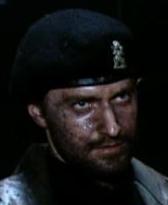Macbeth (RSC)
 In 1999, Richard Armitage joined the Royal Shakespeare Company, and was cast as Angus in Macbeth.
In 1999, Richard Armitage joined the Royal Shakespeare Company, and was cast as Angus in Macbeth.
Gregory Doran’s 1999 production of Macbeth formed part of the RSC Millennium season, and opened at The Swan, Stratford on Avon, to great critical acclaim in November 1999. The production was immediately spoken of as the finest since Trevor Nunn’s production, starring Ian McKellen, in 1976.
Antony Sher’s Macbeth and Harriet Walter’s Lady Macbeth are seen as landmark interpretations. Sher emphasises the black humour of the role of Macbeth, and the brutal courage of the character, while managing to show that the warped ambition is not far from the surface. He said of the role, “Macbeth is the hardest thing I’ve ever done. Every step you take is dangerous because it invites you to be over the top, or silly or hysterical.” [1] Walter’s Lady Macbeth is taut as a bowstring, driven by a mixture of pent-up neurosis and eroticism.
Set in an unspecified militaristic state, this studio production emphasised the energy and pace of the play. In the theatre it ran without an interval, enabling the relentless unravelling of the tragedy to take its full effect. The set was spare, the costumes modern/timeless, the colour palette monochrome, the action played out in brooding twilight.
Richard Armitage plays Angus, one of Duncan’s lords. Duncan’s loyal men are tough soldiers for whom battle is meat and drink. Angus speaks when Macbeth and Banquo are greeted on their return from victory, and later speaks again, as one of the group of lords determined to work for Macbeth’s fall. The rest of the time, he is a presence in many of the other scenes, in attendance on Duncan, and later, Macbeth. He is a fighting man, who looks and feels more at home in filthy, battle-stained fatigues than in dress uniform.
After the Stratford run, the production went on a national and international tour.
Macbeth on TV/DVD
The original cast of the 1999 production was reassembled for the film, which was shot in that legendary venue The Roundhouse, in 2000 empty and awaiting refurbishment. The production was reconceived in gritty documentary-style for the camera, giving the impression, at times, of an undercover report from near the front line of a Balkan war. The venue is one of the stars of the film, its labyrinthine corridors and circular main space enabling the camera to make snaking, circular panning shots around the grouped figures.
Director Gregory Doran said, “Macbeth is, in many ways, the most filmic of Shakespeare’s plays, with its short, quick-fire scenes and its hurtling, dynamic momentum. In the film, I tried to capture its raw energy and dangerous intimacy.” [2]
The film version was shown on Channel 4 on New Year’s Day 2001.
Links
Royal Shakespeare Company: information about this production and about the stage history of Macbeth
Illuminations Media (production company for the filmed version)
Review of the London run at the Young Vic
Article in The Guardian Travel section by Antony Sher on the tour to Japan
Review of the US tour production from the New York Times
BFI Screenonline summary of filmed versions of Macbeth
Sources
[1] Interview in The Independent, quoted on the RSC website
[2] Quoted on the website of Illuminations, the production company for Macbeth.
